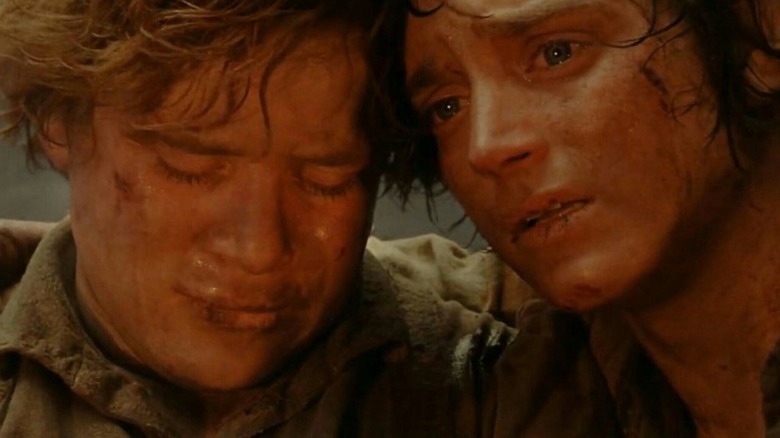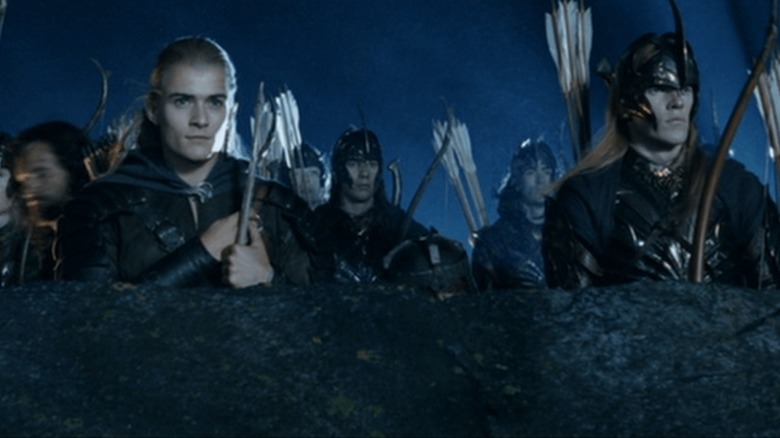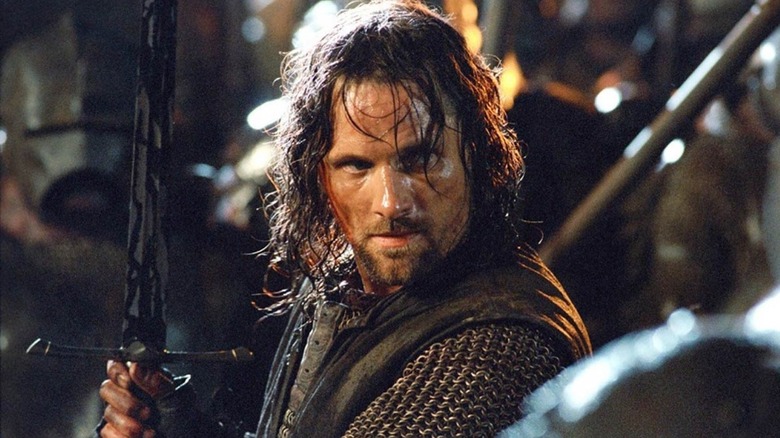'Fate' Flipped Peter Jackson's Plans For His Lord Of The Rings Films
Peter Jackson's "The Lord of the Rings" is a singular filmmaking achievement. Greenlit by the smallish New Line Cinema in 1999, the trilogy was initially budgeted at $180 million. But after a footage presentation at the 2001 Cannes Film Festival wowed audiences, the studio, realizing it had something special in the works, loosened the purse strings. The epic series ultimately cost $281 million, which is plenty steep, but it's a luxury you can afford when the movies go on to make $3 billion at the global box office.
And it all came so close to never happening.
Though J.R.R. Tolkien's fantasy novels were a publishing phenomenon in the 20th century, their popularity had peaked in the 1960s and '70s. Typically, when an undertaking of this magnitude goes into production at a Hollywood studio, it's because there's been a resurgence. Instead, Jackson, who was smarting from the commercial failure of his first studio movie, 1996's "The Frighteners," was banking his entire career on the belief that he could create the resurgence. The industry was still intrigued by Jackson's talent and his New Zealand-based Wētā Workshop special effects company, but no one was willing to back a pricey adaptation of books that were gathering dust in the attics of ex-hippies. No one save for Harvey Weinstein.
Dancing with the devil
Weinstein, who is currently serving a 23-year prison sentence for sexual assault, was at the height of his bullying powers when Jackson pitched his Tolkien passion project. Having drawn the producer's ire by attempting to make two films at Universal – "The Frighteners" and his ill-fated first crack at "King Kong" — prior to the start of his first-look deal at Miramax (which he'd signed after the critical success of 1994's "Heavenly Creatures"), Jackson possessed zero leverage. Knowing this, he proposed a two-part saga: "The Fellowship of the Ring" and "War of the Ring." The scripts were written, and, by all accounts, Jackson had no intention of expanding the work.
Weinstein bit, but capped the budget for both films combined at $75 million. Even with Jackson's home-field advantage in New Zealand, the filmmaker knew this wasn't nearly enough money to do his screenplays justice. So he gingerly talked Weinstein into placing the project into heavily-conditioned turnaround. Jackson then took his duology to New Line, and it was the studio's founder, Robert Shaye, who suggested making a full-blown trilogy.
In an interview with The Cape Cod Times, Jackson marveled over how his Tolkien toe-dip turned into a six-film franchise (along with "The Hobbit"):
"[N]ow, 17 years later, it's become six movies, where we made them the wrong way around. It's all been very weird and unpredictable. It was circumstances and fate. The one thing I'm very proud of is that I think that when people do see the six films as a series, in the right order, they'll sort of sense that there was some vague design behind it all.
Come back to us, Peter Jackson
When he's on his game, there are few filmmakers who can touch Peter Jackson's visual wizardry. So while it was heartening to see him prove the industry wrong when "The Lord of the Rings" became a box-office sensation in the early 2000s, it's a tad depressing that he hasn't personally directed a non-documentary feature since "The Hobbit: The Battle of the Five Armies." Yes, "They Shall Not Grow Old" is an excellent, incredibly moving World War I documentary. And his reassemblage of "Get Back" is an alternately exhilarating and soul-crushing depiction of creation.
But Jackson, who will turn 61 this October (of course he was born on Halloween), is too talented a director to give up on fiction features altogether. Here's hoping he can still summon the chutzpah that hurtled him into the making of one of the greatest film series ever made. Jackson is, at the core of his being, a Derrick. And Derricks absolutely do not run.


